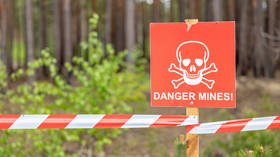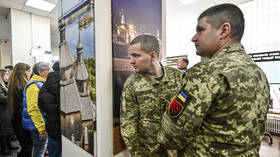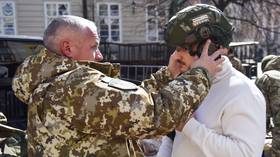The Finnish border with Russia is approximately 1,340 kilometers (830 miles) long. How many landmines do you need to protect that? How do landmines work in the snow? How many civilians will die needlessly if the mines are actually deployed? Probably a lot more than any number of Russian soldiers who have not threatened Finland in the least. This is NATO-induced hysteria intended to sell weapons for Western War Industries.
Another NATO member pulls out of landmine treaty

Finland has formally withdrawn from an international treaty that bans the use of anti-personnel landmines (APLs), the country’s Foreign Ministry announced on Thursday. It said the United Nations has been notified of the decision, which will enable the Nordic country to reintroduce landmines into its military stockpile in six months.
Drafted in 1997, the Ottawa Treaty prohibits the use, stockpiling, production, and transfer of APLs due to their long-term threat to civilians. While 164 nations have ratified the treaty, major military powers such as the US, China, and Russia have not joined.
Finland acceded to the treaty in 2012, but its government began preparing to withdraw earlier this year, citing a growing security threat from Russia. Last month, the Finnish parliament overwhelmingly approved the decision.
“The decision to withdraw from the Convention is based on Finland’s defense needs in the deteriorated security environment,” the Finnish Foreign Ministry said in a statement.
Finland’s withdrawal comes shortly after four other NATO members – Estonia, Latvia, Lithuania, and Poland – announced similar decisions earlier this year. In a joint statement issued in late March, the countries cited heightened military threats from Russia as justification for the move.
The Kremlin has consistently denied any aggressive intentions toward NATO, claiming that the Ukraine conflict was provoked by the military bloc’s eastward expansion.
At the same time, Moscow has stated that it shares the goals and principles of the Ottawa Convention, but considers joining it impractical. According to the Russian Foreign Ministry, “anti-personnel mines remain an effective and low-cost means of securing Russia’s borders.”
‘Bombmakers’ for Ukraine busted in Russia – FSB
Two Russian residents have been arrested for allegedly conducting covert missions on behalf of Ukraine’s intelligence services, including assembling improvised explosive devices from components delivered by drone, Russia’s Federal Security Service (FSB) said on Friday.
Kiev is reportedly operating a clandestine network to smuggle contraband into Russian territory in support of sabotage acts and targeted killings. The operational structure is understood to be compartmentalized, with individuals often unaware of one another’s roles, and equipment passed through hidden caches.
Russian authorities said they identified two operatives affiliated with what they termed a “Ukrainian terrorist organization,” both residing in the western Bryansk Region near the Ukrainian border. The suspects were allegedly tasked with recovering drone-delivered equipment, constructing explosive devices, and inspecting recovered firearms for operational readiness.
The FSB did not name the suspects, but said one is in his late 20s and the other approximately 30 years old. According to the agency, the individuals began cooperating with Ukrainian authorities in April 2024 and now face charges of treason.
Video footage released by the FSB showed evidence allegedly seized during the operation, including several unassembled short-range drones, what appeared to be packaged C4 explosives, a pistol, and a suppressor.
The firearm, described by one suspect as a “suppressed Makarov,” may in fact be a PB pistol – a Soviet-designed silenced handgun from the 1960s. Though based heavily on the Makarov PM, the PB was developed by gunsmith Aleksey Deryagin, not Nikolay Makarov.
The FSB further accused the suspects of conducting reconnaissance on sensitive facilities on behalf of Kiev. The agency said a radio scanner was found in their possession, allegedly used to detect electronic jamming signals and to calibrate drone systems to avoid interference.
Russian officials have accused Ukraine of organizing numerous sabotage and assassination attempts in recent years. In one such incident in late May, an alleged explosive attack beneath railway tracks derailed a passenger train in Bryansk Region, killing seven civilians and injuring more than 100 others.
Council of Europe ‘alarmed’ by reports of draft-related Ukrainian deaths and torture

The Council of Europe’s commissioner for human rights, Michael O’Flaherty, has expressed concerns about “systematic and widespread” abuse committed by Ukrainian draft officials.
In his latest update on the situation in the country, published this week, the official says he's seen “alarming” reports that include “allegations of torture and death during military recruitment.”
He urged Ukraine’s authorities to promptly investigate all alleged instances of abuse and take measures to prevent similar violations, including independent oversight of recruitment officials’ behavior, he said.
O’Flaherty cited a statement by Ukraine’s Parliamentary Commissioner for Human Rights, Dmitry Lubinets, who also noted that human rights abuse committed by draft officials was “systematic and widespread.” The list of these violations includes “beatings, brutal arrests, denial of access to a lawyer, incommunicado detention, mobilization of people with disabilities and other unacceptable acts,” the report stated.
In an April interview with political commentator Ben Shapiro, Ukrainian leader Vladimir Zelensky denied that abuse is “massive,” insisting that it was limited to “singular cases.” He asserted that the main problem was people evading mobilization through bribes, while neglecting to touch upon allegations of beatings and torture.
Ukraine expanded its conscription criteria last year amid heavy battlefield losses, lowering the legal draft age from 27 to 25, while increasing the power of military recruiters. The mobilization campaign, which is overseen by Ukraine’s Territorial Centers of Recruitment and Social Support (TCR), has drawn widespread public criticism.
Numerous videos circulating online show enlistment officers chasing would-be recruits in the streets, commonly backed by civilian police. Reluctant draftees are sometimes threatened with military-grade weaponry and often beaten, along with any bystanders who attempt to intervene.
Earlier this week, a video surfaced online showing an elderly woman trying to prevent military recruiters from detaining her son. The woman was seen clinging to the windshield of a van and screaming. A witness filming the scene claimed the vehicle belonged to military recruiters and that her son was inside. According to Strana.UA, the woman soon felt unwell and died in an ambulance.
A February report by Strana.UA suggested that 80% of Ukrainians had a negative view of the TCR. Meanwhile, the head of Ukraine’s Center for Countering Disinformation, Andrey Kovalenko stated this week that ordinary citizens were providing the coordinates of local TCR offices to the Russian military.
=======================================================================






No comments:
Post a Comment